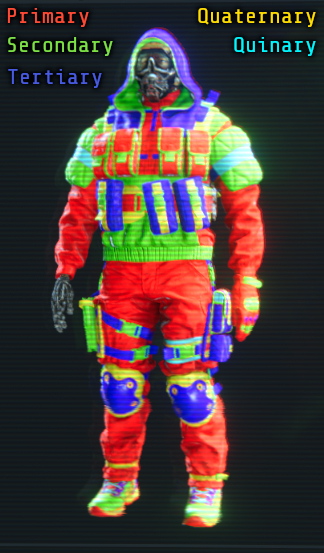Ecosyste.ms: Awesome
An open API service indexing awesome lists of open source software.
https://github.com/aurirex/gtfo_custompalettes
Easy Custom Palette creation via json files.
https://github.com/aurirex/gtfo_custompalettes
game-mod gtfo-game gtfo-modding unity3d
Last synced: 2 months ago
JSON representation
Easy Custom Palette creation via json files.
- Host: GitHub
- URL: https://github.com/aurirex/gtfo_custompalettes
- Owner: AuriRex
- License: mit
- Created: 2024-08-07T00:21:31.000Z (5 months ago)
- Default Branch: main
- Last Pushed: 2024-09-12T20:56:18.000Z (3 months ago)
- Last Synced: 2024-10-10T09:44:02.233Z (2 months ago)
- Topics: game-mod, gtfo-game, gtfo-modding, unity3d
- Language: C#
- Homepage:
- Size: 1.48 MB
- Stars: 0
- Watchers: 1
- Forks: 0
- Open Issues: 0
-
Metadata Files:
- Readme: README.md
- License: LICENSE
Awesome Lists containing this project
README
# GTFO_CustomPalettes
A GTFO mod that lets you add custom color palettes using json files, no Unity or DataBlock fiddling required!
Custom Palettes go into the `BepInEx/Assets/CustomPalettes/` folder (created upon starting the game once with the mod installed).
Additionally a template json file will be generated inside of that folder.
Make sure to copy and rename this template to something else, the template won't be loaded itself.
MTFO Hot-Reloading is supported for palettes **and** texture files, just place them in the folder and hit reload.
## **Either [AllVanity](https://thunderstore.io/c/gtfo/p/AuriRex/AllVanity/) or [DeviousLick](https://thunderstore.io/c/gtfo/p/Frog/DeviousLick/) is required for the Palettes to show up in game!**
## Custom Palettes json file
Textures and colors are applied *multiplicative*, that means if you want your image texture to properly show make sure to set your color to white / `#FFF`
If you set your color to green (`#00FF00`) and choose a rainbow texture `examples/rainbow.png`, then only the parts that are green are gonna show up in game, which results in a stripped pattern alternating green and black.
Also because of this you can treat textures like patterns, where white equals full color and black no color.
Check the `examples` folder in this repo to see a few different patterns.
### Things to be aware of
To avoid conflicts with other palettes I'd recommend making sure your custom palette json files have a unique name;
Maybe include your name, something like `AuriRex_MyCoolPalette1.json` should do the trick.
The same thing goes for textures, I'd recommend creating a folder with the same name as your json file and putting all your textures in there.
Don't forget to include the folder in your `TextureFile` field: `AuriRex_MyCoolPalette1/custom_texture1.png`.
### Tone Reference

### Fields
* `Name`: The name displayed in game in the palettes selection menu.
* `Author`: The palette author, your name most likely (not shown in game atm).
* `SortingName`: A string used in the palette sorting process, you can change this to move your palette up and down (alphabetically sorted)
* `Locked`: Set to `true` if this palette should be locked even with AllVanity installed (unlock them via custom plugin instead)
* `Data`: Contains all the important things:
* `TextureTiling`: How often the texture should tile. (Bigger number = smaller pattern)
* `>Tone`: The five different parts of a palette
* `HexColor`: A HEX string denoting this tones color.
Supported Formats:
* #RRGGBB
* #RRGGBBAA
* #RGB
* #RGBA
* The literal strings: `red`, `cyan`, `blue`, `darkblue`, `lightblue`, `purple`, `yellow`, `lime`, `fuchsia`, `white`, `silver`, `grey`, `black`, `orange`, `brown`, `maroon`, `green`, `olive`, `navy`, `teal`, `aqua`, `magenta`.
* `TextureFile`: The (relative) path to an image file (.png or .jpg)
* `MaterialOverride`: Used to override the material used on this tone, leave as -1 if unsure.
## A few example palettes:
### Colors only
```json
{
"Name": "My Cool Palette",
"Author": "AuriRex",
"SortingName": "SomethingHere",
"Locked": false,
"Data": {
"PrimaryTone": {
"HexColor": "#FF0000",
"TextureFile": "",
"MaterialOverride": -1
},
"SecondaryTone": {
"HexColor": "#007700",
"TextureFile": "",
"MaterialOverride": 1
},
"TertiaryTone": {
"HexColor": "#1c0000",
"TextureFile": "",
"MaterialOverride": -1
},
"QuaternaryTone": {
"HexColor": "#010101",
"TextureFile": "",
"MaterialOverride": -1
},
"QuinaryTone": {
"HexColor": "#810093",
"TextureFile": "",
"MaterialOverride": 2
},
"TextureTiling": 20
}
}
```
### With Images
In this example, the `icon.png` file has been placed into the folder `AuriRex_MyCoolPalette`, next to our palette json file.
```json
{
"Name": "My Cool Textured Palette",
"Author": "AuriRex",
"SortingName": "SomethingHere",
"Data": {
"PrimaryTone": {
"HexColor": "#FFFFFF",
"TextureFile": "AuriRex_MyCoolPalette/icon.png",
"MaterialOverride": -1
},
"SecondaryTone": {
"HexColor": "#007700",
"TextureFile": "AuriRex_MyCoolPalette/icon.png",
"MaterialOverride": 1
},
"TertiaryTone": {
"HexColor": "#1c0000",
"TextureFile": "AuriRex_MyCoolPalette/icon.png",
"MaterialOverride": -1
},
"QuaternaryTone": {
"HexColor": "#013101",
"TextureFile": "AuriRex_MyCoolPalette/icon.png",
"MaterialOverride": -1
},
"QuinaryTone": {
"HexColor": "#310093",
"TextureFile": "AuriRex_MyCoolPalette/icon.png",
"MaterialOverride": 2
},
"TextureTiling": 20
}
}
```